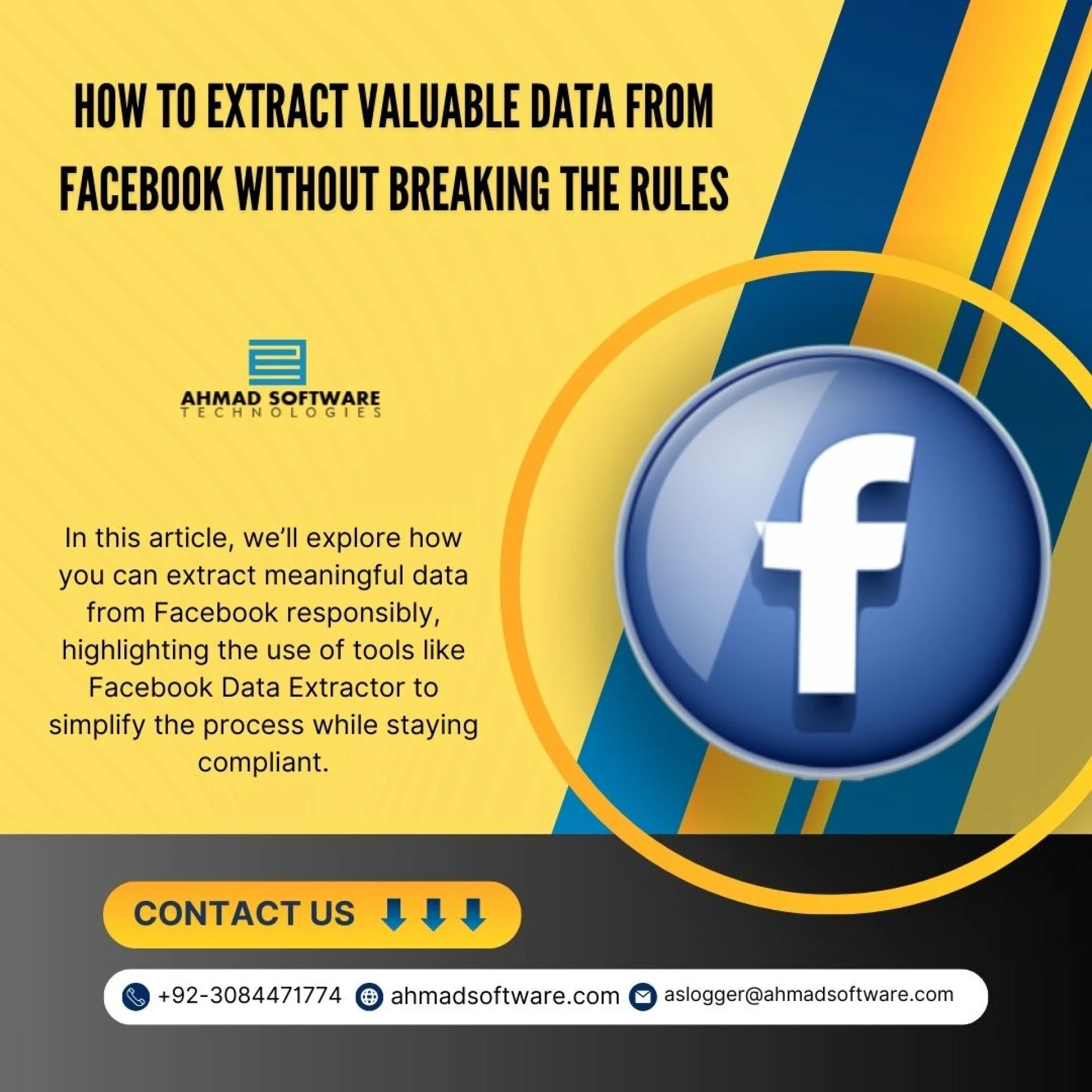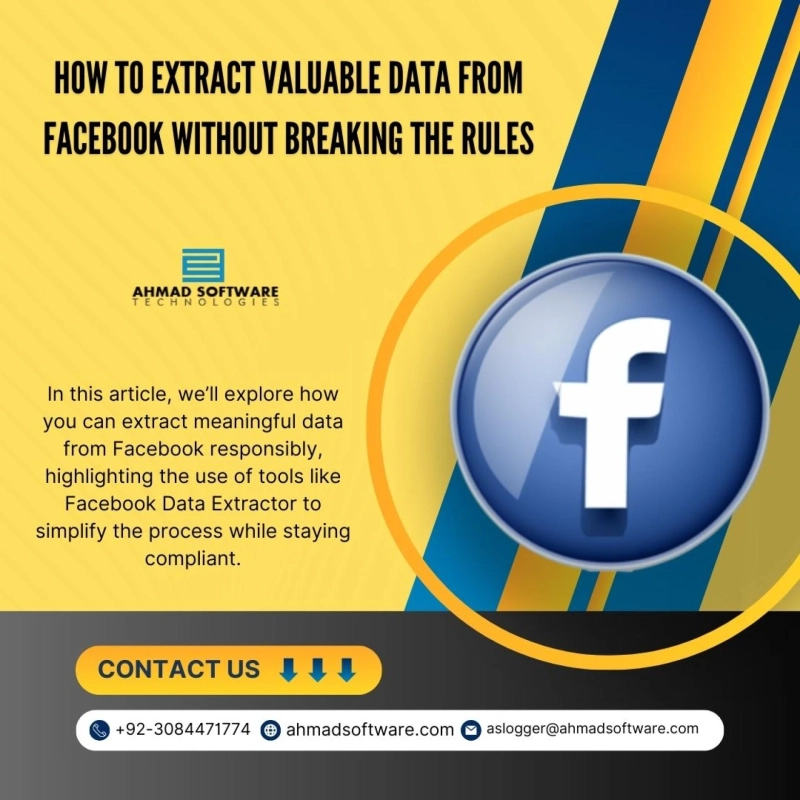In the digital era, data has become one of the most valuable assets for businesses, researchers, and marketers. Platforms like Facebook, which host millions of users, are treasure troves of actionable insights. However, extracting valuable data from Facebook requires careful adherence to ethical guidelines and legal frameworks. In this article, we’ll explore how you can extract meaningful data from Facebook responsibly, highlighting the use of tools like Facebook Data Extractor to simplify the process while staying compliant.
Why Extract Data from Facebook?
Facebook is a goldmine of information. With billions of active users sharing content, businesses, and researchers can leverage this platform to:
- Analyze customer demographics.
- Monitor market trends and consumer behavior.
- Assess brand reputation through sentiment analysis.
- Generate leads for targeted marketing campaigns.
- Conduct academic or social research.
However, the challenge lies in accessing this data ethically and efficiently, ensuring user privacy is respected and legal boundaries are not crossed.
Understanding the Legalities of Data Extraction
Before delving into data extraction methods, it’s crucial to understand the legal and ethical considerations:
- Facebook’s Terms of Service: Facebook prohibits unauthorized scraping of its platform. Violating these terms could lead to account bans, legal action, or financial penalties.
- Privacy Laws: Regulations like the General Data Protection Regulation (GDPR) in Europe and the California Consumer Privacy Act (CCPA) in the U.S. enforce strict data privacy rules. These laws require user consent before collecting and using personal information.
- Public vs. Private Data: While scraping publicly available data is generally less contentious, collecting private or sensitive information without consent is strictly prohibited.
By understanding and adhering to these legal frameworks, you can ensure your data extraction practices remain compliant and ethical.
Facebook Data Extractor: A Key Tool for Ethical Data Collection
One of the most reliable tools for collecting Facebook data is Facebook Data Extractor. Designed to simplify the process, this software offers a range of features that enable users to extract meaningful data efficiently while prioritizing compliance and ethics.
Key Features of Facebook Data Extractor
- Targeted Data Collection: Extract data from specific Facebook pages, posts, groups, or events based on predefined keywords or parameters.
- Customizable Filters: Narrow down your search by location, language, or time frame to ensure relevancy.
- Data Export Options: Export data into CSV, Excel, or JSON formats for easy analysis.
- Privacy Safeguards: Anonymize extracted data to protect user identities and maintain compliance with privacy regulations.
- User-Friendly Interface: Intuitive navigation ensures even non-technical users can operate the tool effectively.
Facebook Profile Extractor streamlines the data collection process, saving time and resources while reducing the risk of violating legal guidelines.

Steps to Extract Data Using Facebook Data Extractor
Here’s a step-by-step guide to using Facebook Leads Extractor for ethical data collection:
1. Define Your Objectives
- Identify the purpose of your data extraction. Are you analyzing customer sentiment, researching a specific topic, or studying engagement trends? Having clear objectives will help you collect relevant data efficiently.
2. Set Up the Tool
- Install Facebook Contact Extractor and configure it based on your requirements. Input your filters, such as keywords, locations, or time frames, to refine your search.
3. Authenticate Access
- Ensure you are using an authorized Facebook account and have obtained the necessary permissions for accessing public pages, groups, or posts.
4. Start the Extraction Process
- Initiate the data extraction. The tool will collect information based on your predefined criteria, such as user interactions, comments, reactions, or post analytics.
5. Export and Analyze Data
- Once the data is extracted, export it into a preferred format. Use analytical tools to process and interpret the data for actionable insights.
By following these steps, you can extract valuable data while adhering to ethical and legal standards.
Best Practices for Ethical Data Extraction
To ensure your data extraction activities remain responsible and compliant, consider the following best practices:
- Obtain User Consent
- If you are collecting data beyond what is publicly available, ensure you have explicit user consent. Transparency builds trust and reduces the risk of legal complications.
- Use Public APIs When Possible
- Facebook’s official Graph API allows developers to access data in a controlled and authorized manner. Leveraging this API ensures compliance with Facebook’s terms of service.
- Anonymize Sensitive Data
- Remove or obscure personally identifiable information (PII) from datasets to protect user privacy.
- Avoid Overloading Servers
- Excessive or rapid data requests can strain Facebook’s infrastructure and trigger anti-scraping mechanisms. Use rate limits to prevent detection and ensure sustainability.
- Regularly Review Regulations
- Stay updated on data protection laws and Facebook’s evolving policies to ensure ongoing compliance.
The Role of Data Extraction in Modern Business
Data extraction from Facebook is an invaluable asset for businesses aiming to stay competitive. By leveraging tools like Facebook Data Extractor, organizations can:
- Identify emerging trends and consumer needs.
- Improve customer targeting and engagement strategies.
- Monitor brand reputation and competitor activities.
- Drive informed decision-making based on real-time data.
When performed responsibly, data extraction can transform raw information into actionable insights, enabling businesses to achieve their objectives efficiently.
Conclusion
Extracting valuable data from Facebook offers immense opportunities for businesses and researchers, but it comes with significant responsibilities. Tools like Facebook Pages Data Extractor simplify the process, making it easier to collect, organize, and analyze data effectively. However, ethical and legal compliance should always remain at the forefront of any data collection effort.
By following best practices, using authorized tools, and respecting user privacy, you can harness the power of Facebook data to drive meaningful outcomes without breaking the rules. In an era where data drives innovation, responsible extraction is the key to unlocking its full potential.
Buy Now:
Email: aslogger@ahmadsoftware.com
WhatsApp: +92-3084471774



